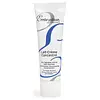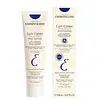What's inside
What's inside
 Key Ingredients
Key Ingredients

No key ingredients
 Benefits
Benefits

 Concerns
Concerns

 Ingredients Side-by-side
Ingredients Side-by-side

Water
Skin ConditioningParaffinum Liquidum
EmollientStearic Acid
CleansingGlyceryl Stearate
EmollientTriethanolamine
BufferingCera Alba
EmollientCetyl Palmitate
EmollientButyrospermum Parkii Butter
Skin ConditioningSteareth-10
EmulsifyingPolyacrylamide
C13-14 Isoparaffin
EmollientLaureth-7
EmulsifyingPropylene Glycol
HumectantHydrolyzed Soy Protein
HumectantAloe Barbadensis Sprout
Humectant1,2-Hexanediol
Skin ConditioningCaprylyl Glycol
EmollientTropolone
Skin ConditioningParfum
MaskingWater, Paraffinum Liquidum, Stearic Acid, Glyceryl Stearate, Triethanolamine, Cera Alba, Cetyl Palmitate, Butyrospermum Parkii Butter, Steareth-10, Polyacrylamide, C13-14 Isoparaffin, Laureth-7, Propylene Glycol, Hydrolyzed Soy Protein, Aloe Barbadensis Sprout, 1,2-Hexanediol, Caprylyl Glycol, Tropolone, Parfum
Water
Skin ConditioningCaprylic/Capric Triglyceride
MaskingGlycerin
HumectantOctyldodecanol
EmollientPolyglyceryl-3 Methylglucose Distearate
EmulsifyingButyrospermum Parkii Butter
Skin ConditioningCera Alba
EmollientJojoba Esters
EmollientHelianthus Annuus Seed Wax
Skin ConditioningGlyceryl Stearate
EmollientXanthan Gum
Emulsifying1,2-Hexanediol
Skin ConditioningCaprylyl Glycol
EmollientSodium Hydroxide
BufferingAcrylates/C10-30 Alkyl Acrylate Crosspolymer
Emulsion StabilisingPolyglycerin-3
HumectantAcacia Decurrens Flower Wax
EmollientAloe Barbadensis Leaf Juice Powder
Skin ConditioningTocopherol
AntioxidantTropolone
Skin ConditioningGlycine Soja Oil
EmollientHydrolyzed Soy Protein
HumectantWater, Caprylic/Capric Triglyceride, Glycerin, Octyldodecanol, Polyglyceryl-3 Methylglucose Distearate, Butyrospermum Parkii Butter, Cera Alba, Jojoba Esters, Helianthus Annuus Seed Wax, Glyceryl Stearate, Xanthan Gum, 1,2-Hexanediol, Caprylyl Glycol, Sodium Hydroxide, Acrylates/C10-30 Alkyl Acrylate Crosspolymer, Polyglycerin-3, Acacia Decurrens Flower Wax, Aloe Barbadensis Leaf Juice Powder, Tocopherol, Tropolone, Glycine Soja Oil, Hydrolyzed Soy Protein
 Reviews
Reviews

Ingredients Explained
These ingredients are found in both products.
Ingredients higher up in an ingredient list are typically present in a larger amount.
1,2-Hexanediol is a synthetic liquid and another multi-functional powerhouse.
It is a:
- Humectant, drawing moisture into the skin
- Emollient, helping to soften skin
- Solvent, dispersing and stabilizing formulas
- Preservative booster, enhancing the antimicrobial activity of other preservatives
This ingredient is also known as shea butter. It is an effective skin hydrator and emollient.
Emollients help soothe and soften your skin. It does this by creating a protective film on your skin. This barrier helps trap moisture and keeps your skin hydrated. Emollients may be effective at treating dry or itchy skin.
Shea butter is rich in antioxidants. Antioxidants help fight free-radicals, or molecules that may harm the body. It is also full of fatty acids including stearic acid and linoleic acid. These acids help replenish the skin and keep skin moisturized.
While Shea Butter has an SPF rating of about 3-4, it is not a sunscreen replacement.
Shea butter may not be fungal acne safe. We recommend speaking with a professional if you have any concerns.
Learn more about Butyrospermum Parkii ButterCaprylyl Glycol is a humectant and emollient, meaning it attracts and preserves moisture.
It is a common ingredient in many products, especially those designed to hydrate skin. The primary benefits are retaining moisture, skin softening, and promoting a healthy skin barrier.
Though Caprylyl Glycol is an alcohol derived from fatty acids, it is not the kind that can dry out skin.
This ingredient is also used as a preservative to extend the life of products. It has slight antimicrobial properties.
Learn more about Caprylyl GlycolCera alba is beeswax, or the wax used by bees to make honeycombs. It is a texture-enhancer and emollient. A study from 2003 found beeswax to be a stronger emollient than ingredients such as petroleum jelly.
As an emollient, beeswax helps hydrate the skin by creating a barrier on top. This barrier traps moisture in.
Emulsifiers help prevent ingredients from separating. This helps create consistent texture.
The structure of beeswax is mainly long-chain alcohols and the esters of fatty acids.
There are three types of beeswax: yellow, white, and absolute. Yellow is pure beeswax taken from the honeycomb. White beeswax is created by filtering or bleaching yellow beeswax. Absolute beeswax is created by treating beeswax with alcohol. Beeswax used in cosmetics are purified.
Beeswax has been used throughout history and even in prehistoric times. Some common uses for beeswax still used today are making candles, as a waterproofing agent, and polish for leather.
Learn more about Cera AlbaGlyceryl Stearate is a mix of glycerin and stearic acid.
It is used to stabilize the mixing of water and oil ingredients. By preventing these ingredients from separating, it can help elongate shelf life. It can also help thicken the product's texture.
As an emollient, it helps soften skin and supports barrier-replenishing ingredients.
In cosmetics, Glyceryl Stearate is often made from vegetable oils or synthetically produced.
This ingredient may not be fungal-acne safe
Fun fact: The human body also creates Glyceryl Stearate naturally.
Learn more about Glyceryl StearateHydrolyzed Soy Protein is a vegan protein made to mimic hydrolyzed collagen. It is created from soy, or glycine soja.
This ingredient is a humectant, meaning it helps hydrate the skin by binding to water. According to a manufacturer, it is also a great hair conditioner.
Read more about hydrolyzed collagen here.
Learn more about Hydrolyzed Soy ProteinWe don't have a description for Tropolone yet.
Water. It's the most common cosmetic ingredient of all. You'll usually see it at the top of ingredient lists, meaning that it makes up the largest part of the product.
So why is it so popular? Water most often acts as a solvent - this means that it helps dissolve other ingredients into the formulation.
You'll also recognize water as that liquid we all need to stay alive. If you see this, drink a glass of water. Stay hydrated!
Learn more about Water